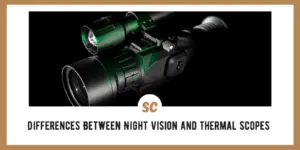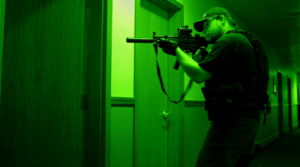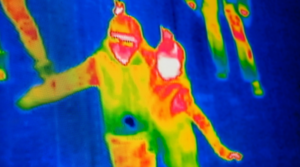There are a lot of different types of scopes available on the market today and choosing the right one can be a critical factor depending on what it is used for. Distance, price range, the environment the scope will be used in, and what will be detected, are all important factors to consider.
Traditional scopes are basically a monocular with varying degrees of magnification for detecting objects at different distances. They have been used for a long time and are among the most affordable and widely used types of scope.
However, if you are looking for a more high-tech scope to mount on your firearm, night vision and thermal scopes are two great options. But how are do they work, are they different, and is one better than the other? Read on to find the answers to these questions and more.
SKIP AHEAD
Night Vision Explained
Night vision works by detecting ambient light from the surroundings and amplifying it. This means that night vision works great in very low light conditions and at night, hence its name.
However, there are a few problems with using night vision.
Since it amplifies light from its surroundings, it cannot be used during the daytime, unless of course, you are in a darkened structure. Using a night vision scope during the day can damage components within scope. It will also be next to impossible to see anything through it because it would be like looking directly into the beam of a high-powered flashlight.
It also becomes more difficult to see and define objects the further away they are. If an object can mask its heat signature or camouflage itself from the surrounding light, it would be very difficult to pick up with a night vision scope.
What if the scope is being used in an environment where there is zero ambient light, would it still work? The short answer is no, at least not by itself. In environments where there is no ambient light, a night vision scope can still be used if it is paired with an IR (infrared) light. This type of light is invisible to the human eye but can be picked up by a night vision scope. Think of it as shining an invisible flashlight at something.
The technology for night vision scopes has been around and used for decades. Many different companies offer this type of scope which makes it a more affordable option.
Thermal Scopes Explained
Thermal scopes detect the differences in radiation, heat, from one object to the next. These are displayed as varying degrees of greys, whites, or other colors depending on the brand or type of thermal scope that is being used. The more heat an object gives off, the brighter and more defined it will appear through the scope.
For example, if a deer was standing in front of a thicket of trees, the trees would be much duller in appearance than the deer. This is because the deer gives off much more heat than the trees.
Since thermal scopes detect the difference in heat between objects, they can be used to spot warm or hot objects from a great distance, or even if the object is hiding behind vegetation or camouflaged in some other way. They can also be used during the daytime or at night. These are the primary advantages that thermal scopes have over night vision.
Since thermal scopes are newer than night vision, they are still evolving and not as widely available and this makes them more expensive than night vision scopes.
FAQs
Due to the heat of the sun, some objects may appear more defined during the day than at night, but a thermal scope can be used during the day or nighttime hours.
Both night vision and thermal scopes are dependent on a battery source. Without a source of power, they will not operate. Both types of scopes can operate for several hours depending on their brand and the type of battery that is used.
Night vision and thermal scopes are legal to own in some areas, but they are also illegal to own in other areas. Always check your local firearm laws before purchasing or using either type of scope.
Wrap Up
Both scopes have their pros and cons and each one offers something that the other does not have. By carefully evaluating what you will be using the scope for and under what conditions, I am sure that one of these scopes will suit your needs.
Thanks for reading and if you have any thoughts or questions about night vision or thermal scopes be sure to sound off in the comment section below and let us know!




